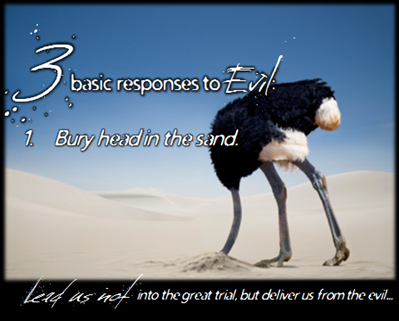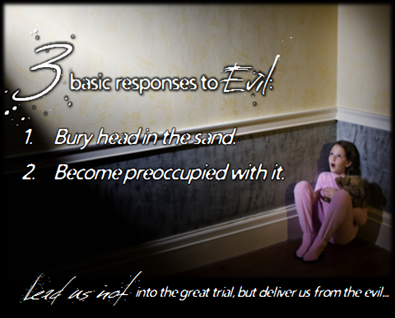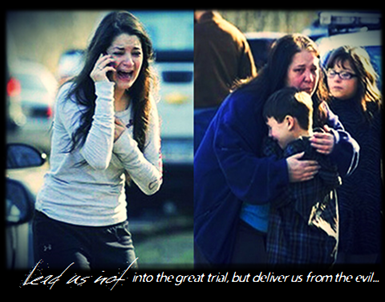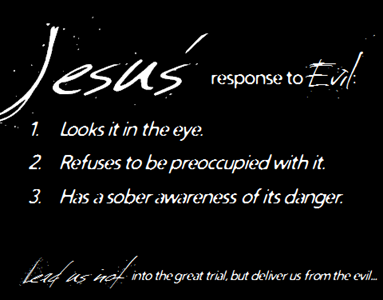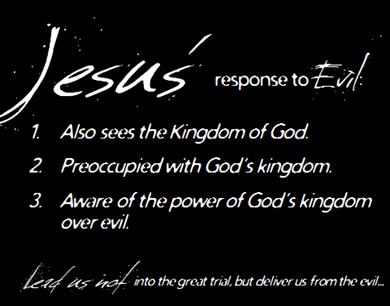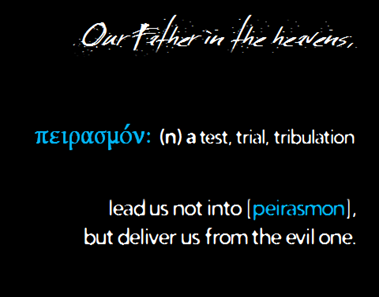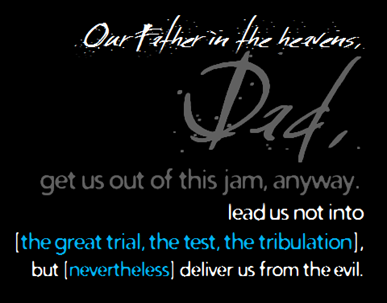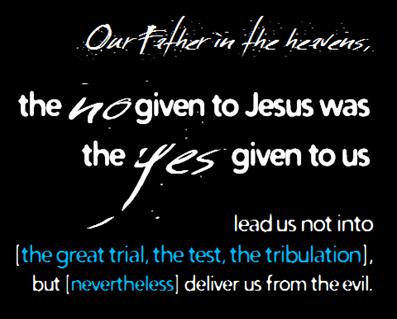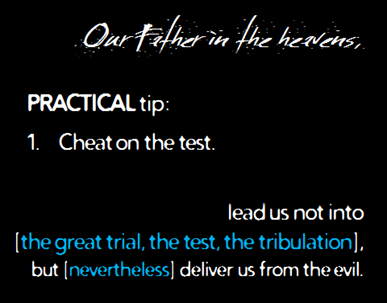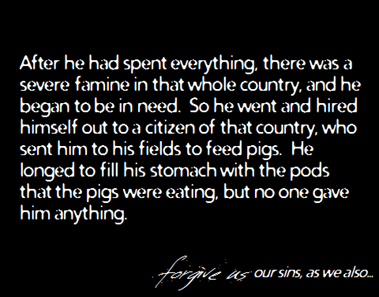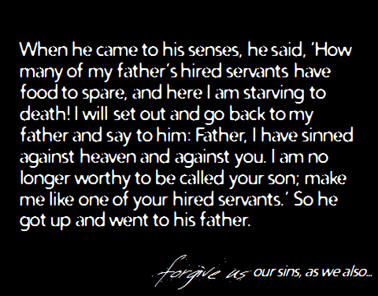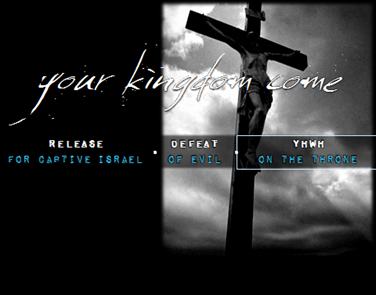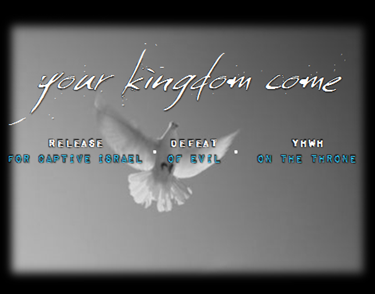sermon notes from the Vineyard Church of Milan 12/16/2012
watch video at www.sundaystreams.com/go/MilanVineyard/ondemand
[swimming in the pool vs. the ocean..."there's life in the ocean."]
Our topic today is: How do we deal with evil, Jesus style? Whether that evil is a big bad thing going on in the world, or some bad thing closer to home, or even something like a temptation.
Our answer is in is the last line in the prayer Jesus taught his disciples to pray: Lead us not into [the great trial, the test, the tribulation], but deliver us from the evil.
We don't go looking for it, to pick a fight. Neither are we on the run from it, out of fear. Instead, we trust our Father in the heavens that if we stay close to him and evil is in the vicinity, then he has a way through it for us. It might not be the way we'd choose, but it will be the way that leads to evil's defeat.
We already know that the Father has spared us the capital T trial, test, tribulation. We already know that the Father has ultimately delivered us from evil. In Jesus' resurrection, God has guaranteed our future. He will one day set everything right, just as everything has been set right in Jesus' resurrection body. But nonetheless, evil is still present in our world, and it affects us, troubles us, has the capacity to cause us and our neighbors great grief. So what does this prayer teach us about how Jesus would have us respond to evil as his followers, as students learning to live from him in the light of the good news of God's kingdom?
In Jesus' day there were three basic responses to evil.
The Sadducees typified the bury your head in the sand approach. "It's not that bad." [Nazi Germany early on...]
The second is the mirror image: to become preoccupied with evil. To see it everywhere, and feel like you've got no hope of opposing it. So run as far away as you can. That was the Essenes.
The third was the approach of the Pharisees. It's the self-righteous approach: "Sure, evil's real. It’s the fault of those idiots out there. If they’d just get their act together, I wouldn’t have to deal with all this hassle. Now I’ve got to go fix all this mess others have created, starting with fixing these losers!"
[Shooting in Connecticut... Some want to keep it at arm’s length, hope it is an isolated incident that won’t ever get closer to home, put it out of sight, out of mind. Some wallow in it, get depressed, connect it to all the other bad things in the world, let it affirm to them their deep suspicions that the world is a terrible place to be, throw up their hands and say let’s just find a way to start all over, get away from everything that led to this. Some want to figure out who to blame (video games, music, bad parenting, drugs, who knows?), to say I know how to keep this from happening again, use it as an opportunity to move their agenda forward.]
Jesus' approach to evil?
Unlike the Sadducees, Jesus doesn't minimize evil. He looks it in the eye. He sees evil for what it is. Real, powerful. Insidious. Destructive. Somehow more than the sum of its parts, personally opposed to the good purposes of God on the earth, bent on ruining the image of God in human beings.
At the same time, unlike the Essenes, Jesus refuses be preoccupied with it. Evil, from Jesus' perspective, is never to be given a controlling interest in one's life; to do so would just be another form of surrender to evil.
And unlike the Pharisees, Jesus isn't eager to go toe to toe with evil, self-righteously proclaiming an invulnerability to its influence. Rather, Jesus knows evil is present and active everywhere, even within us. He has a sober awareness of its danger. Facing it on our own, it will destroy us, because we have given it authority over us by our cooperative complicity.
At the same time, Jesus also sees the kingdom of God for what it is. Real, powerful. Creative. Astoundingly beautiful, life-giving. The great reversal, setting everything right.
And in light of the good news of the kingdom, Jesus knows evil is not going to have the last word. Though it may, of course, have many deafening words left to shout. Yet, evil is not to be feared; the God of the kingdom is the one to be feared, and he loves us. If Jesus is going to be preoccupied, he's going to be preoccupied with the God's kingdom.
And Jesus is aware of the power of God's kingdom over evil. He knows that in this age of grace, even now and today, God's kingdom is present and active everywhere, even within us sinners. As he faces evil with confidence in the good news of the kingdom, he knows evil will be destroyed.
In this prayer, Jesus shows us the way to confront evil. Walking towards the Father, even in the face of evil. Trembling, but with the fear of the Lord, not afraid of the evil itself. Praying to be delivered from evil, but in the same breath surrendering to the Father's will with regard to it, knowing that his Kingdom will win the day, and that's all that matters in the end.
Let's break it down.
Lead us not...
Implies we're being led, doesn't it? Not "help us not stumble into the great test..." but, rather, "Lead us not...". We're only being led if we're keeping our eyes on the Father and going wherever we see him going.
If our eyes are fixed on the bad things around us, from the outright evils oppressing our world to the temptations that entice us into destructive choices, we're not being led by the Father. We're being led by evil. It's as simple as that.
Are you keeping an eye on evil so you can avoid it? If so, then Evil is leading your life. And evil will lead you to destruction. Are you looking under every rock for evil so you can fight it? Evil is leading your life. And evil will lead you to destruction.
The way of Jesus is to look to see what the Father is doing, and join in. No matter where it leads you. Simple as that.
Is the Father extending a welcome to the sinners? Jesus goes to the party. Not to pick a fight with the evil present in their lifestyles, not to pick a fight with the forces that have excluded them from community. Not afraid of either of those things, either. He goes to announce, demonstrate, embody good news. Is the Father healing a leper? Jesus goes to heal him. Not to pick a fight with leprosy. Not afraid of it, either. He goes to announce, demonstrate, embody good news. Is the Father leading him to Jerusalem, where a trial and a crown of thorns and 39 lashes and a cross await? Jesus enters on a donkey, despite the cautions of his followers. Not to pick a fight with Rome, or the leaders in Israel conspiring against him, nor the devil himself. But not afraid of them either. He goes to announce, demonstrate, embody good news.
And whenever evil does make its presence known to him along the way, Jesus' attention is directed to the Father. Father, please don't lead us into this test. I can tell evil is gaining strength like a gathering storm, and I really don't want to be there when the thunder and lightning start. But on the other hand, I do want you to deliver us from this evil. So I will keep my eyes fixed on you - confident that your love is bigger than this storm - and I will go wherever you are leading me.
God is saving the world right now. He's not mainly giving us comfortable lives. We're the followers of his son, on whom he's pouring out his Spirit to continue the work of his son. His son has won the decisive victory that empowers us to join him in his work. This is the prayer we pray along the way to picking up our crosses and following him.
Climate Change/Financial Crisis/Poverty/Racism/Sex Trade/War/etc. We don't bury our heads in the sand and say, "It's not that bad." Neither do we get preoccupied with it, fretting, worrying, complaining, railing against ___________. Nor do we treat it like it's only the fault of others in their sin, for us to come swooping in self-righteously with our prescription for the cure.
Instead, we begin by going to our Father in the heavens. A great test is brewing, Papa. Please don't lead us into it - it promises to be very difficult. But still, nevertheless, we want to be delivered from this evil that causes us to destroy the world you've given us in order to have what we want, even at the expense of __________ to which/to whom you made us to bear your image. If you want me to pick up this cross and follow Jesus as part of his victory over this evil in the world, then not my will, but your will be done.
And then we look to see what the Father is doing, and go wherever we see him leading us, announcing, demonstrating, embodying his good news when we get there. Because Jesus already died on the cross and rose from the dead; his kingdom already has the last word. We have nothing to fear, even though it may not be easy. This is how the abolition movement came into being in the United States. This is how the civil rights movement came into being. This is how Jesus' victory on Easter begins to be implemented in the world today.
Or some more local symptom of evil gets our attention. Women being abused by their husbands, feeling trapped, powerless. Unborn children losing their lives because their mothers feel like they've no better options. Boys growing up without good men to mentor them and encourage them on a healthy, life-giving path. Family’s struggling to make ends meet because of illness or job josses or addictions.
We don't say, "It's not that big a deal, it'll all work out with a little extra effort here or there." We don't get preoccupied with it, fretting, worrying, complaining, railing. Nor do we treat it like it's only the fault of others in their sin, for us to come swooping in self-righteously with our prescription for the cure.
Instead, we begin by going to our Father in the heavens. A great test is brewing, Papa. Please don't lead us into it - it promises to be very difficult. But still, nevertheless, we want to be delivered from this very real evil and all its destructive consequences. If you want me to pick up this cross and follow Jesus as part of his victory over this evil in the world, then not my will, but your will be done.
And then we look to see what the Father is doing, and go wherever we see him leading us, announcing, demonstrating, embodying his good news when we get there. Because Jesus already died on the cross and rose from the dead; his kingdom already has the last word. We have nothing to fear, even though it may not be easy. This is how youth ministries are born, or recovery ministries, or compassion ministries. This is how Jesus' victory on Easter begins to be implemented in our community today.
Let's make it even more personal. You find out from your doctor that you have cancer. Or your child has down syndrome. Or the bank or your landlord has lost patience with your job search, and you're going to be evicted . Or your spouse is having an affair.
You don't minimize it, pretend that it will just work itself out with a little extra effort. You don't fix your eyes on it, either, let it dominate your attention. Nor do you delude yourself that if you do everything right, you'll be able to put the evil in its place, that it won't be able to touch you.
No. You begin my going to your Father in the heavens, who has already demonstrated the extent to which he loves you by sending his Son to the cross to defeat every evil that assaults you, who is as close to you as your next breath. A great test is brewing, Papa. Please don't lead us into it - it promises to be very difficult, maybe more difficult than I am up for. But still, nevertheless, we want to be delivered from cancer, from down syndrome, from impoverishment, from infidelity. If you want me to pick up this cross and follow Jesus as part of his victory over this evil in the world, then not my will but your will be done.
And then you look to see what the Father is doing, and go wherever you see him leading you, announcing, demonstrating, embodying his good news when you get there. Because Jesus already died on the cross and rose from the dead; his kingdom already has the last word. We have nothing to fear, even though it may not be easy. This is how the saints bear suffering with grace and rejoice even in the midst of it. This is how parents sacrificially love their children through great difficulty and the enemy loses ground in their family. This is how broken marriages are miraculously put back together against all odds. This is how Jesus' victory on Easter begins to be implemented in our lives today.
Practical Tips:
1. Sprinkle on some Gethsemane: Not my will, but yours be done.
It will remind you that you pray this prayer now as an apprentice of Jesus, and sometimes God's answer to you also will be no, for the sake of his kingdom.
2. Make it a habit. Pray this every day, in advance of whatever trial may arrive that day.
We have self-supervision exhaustion point, so our only hope to consistently follow the way of Jesus in the face of evil is to make it our habitual response to surrender to the Father, not to evil, when evil shows up. [explain...]
It's a discipline that creates a tipping point for us in our response to evil. To whom will our surrender be directed? To evil? Or to the Father? This prayer practiced daily may well provide the tipping point for our surrender. [explain...]
2. Go to bed with thanks. Say thanks at the end of each day for whatever answer God gives you that day. Whether it's yes, or no.
Consider it pure joy, my brothers and sisters, whenever you face trials of many kinds, because you know that the testing of your faith produces perseverance. Let perseverance finish its work so that you may be mature and complete, not lacking anything.
James 1:2-4
"When darkness breaks, glory itself awakes."
The dark night wakes, the glory breaks, and Christmas comes once more…



